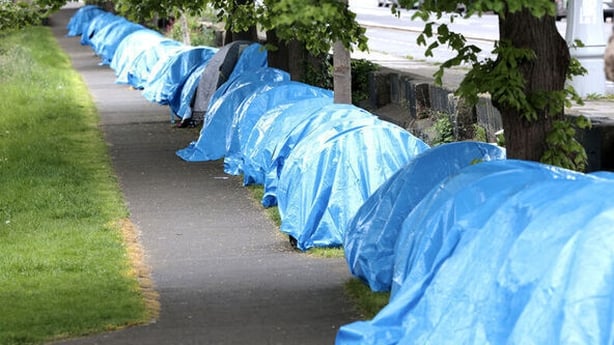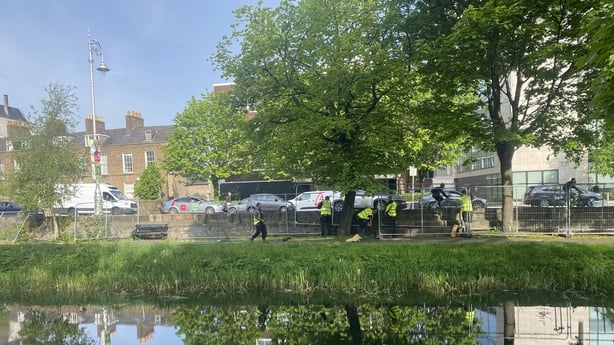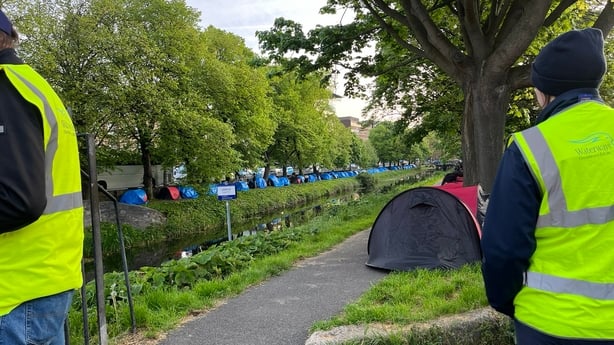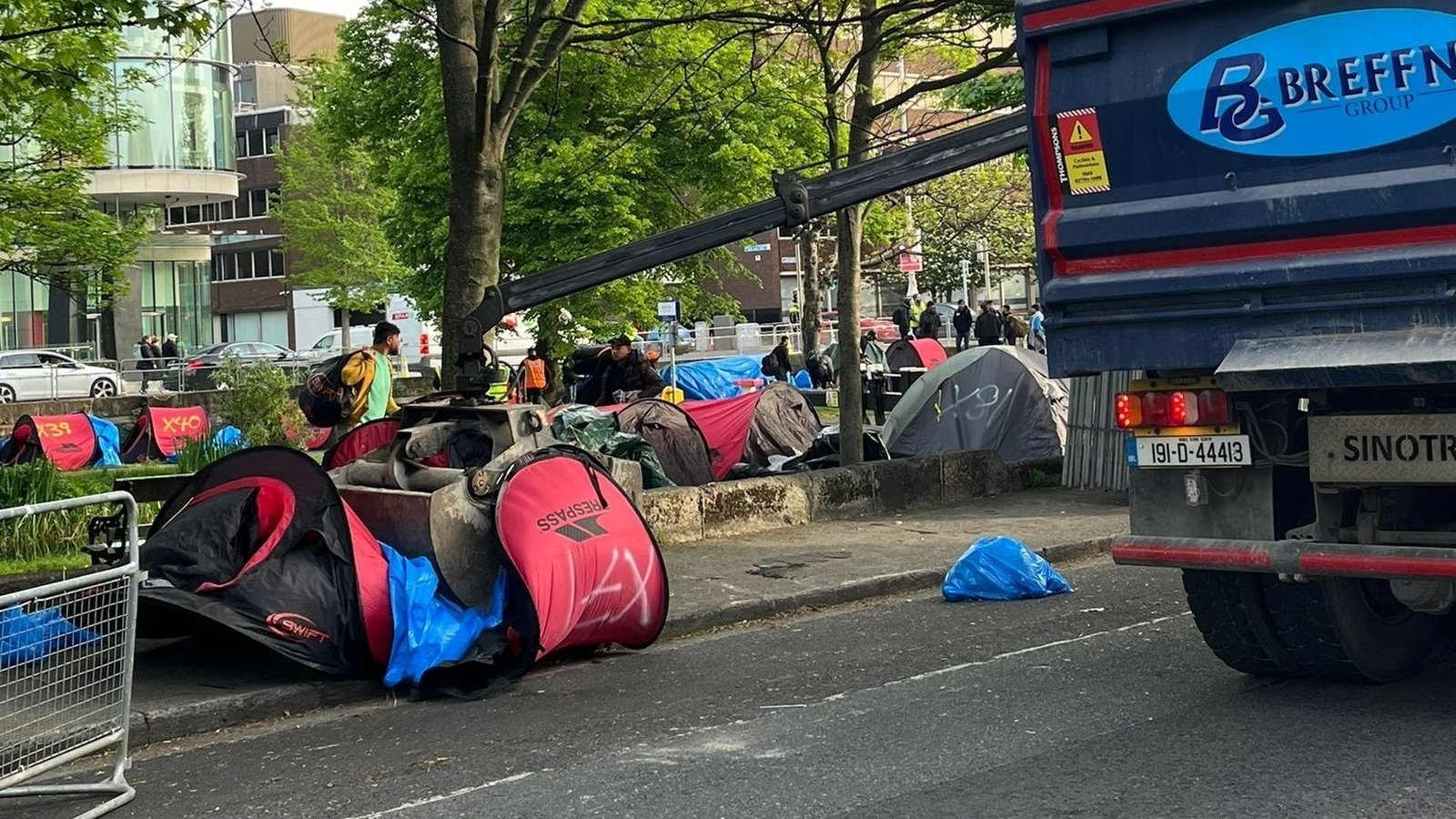Tánaiste Micheál Martin has said that tents being pitched by asylum seekers coming into Ireland are not safe and should not be encouraged, adding that tents will “be removed as they are put up”.
“Tents are not safe, and they should not be supported or encouraged in any way,” Mr Martin said on RTÉ’s Six One news.
The Tánaiste said that the Government had to provide additional sites for proper tented accommodation in the short-term on State-owned sites.
It comes after more than 100 tents pitched along the Grand Canal were removed this morning and asylum seekers relocated to other accommodation.
A joint operation took place in Dublin this morning involving the Departments of Integration and Justice, An Garda Síochána, Dublin City Council, Health Service Executive and Waterways Ireland.
From 5.30am teams from the different agencies gathered on the Grand Canal, with the operation beginning between 6.30am and 7am.
We need your consent to load this comcast-player contentWe use comcast-player to manage extra content that can set cookies on your device and collect data about your activity. Please review their details and accept them to load the content.Manage Preferences
Taoiseach Simon Harris said that 168 people were moved from the Grand Canal area and offered alternative accommodation. The locations they were taken to were Crooksling, and the former Central Mental Hospital in Dundrum.
New figures from the Department of Integration showed that, before this morning’s operation, a total of 1,825 unaccommodated International Protection Applicants (IPAs) were waiting for an offer of State shelter. That is up 61 on yesterday and 149 since Friday.
The figures do not reflect the more than 160 rough-sleeping asylum seekers who were moved from the Grand Canal to IPAs accommodation today as the number given for those previously unaccommodated, who subsequently received an offer, remained the same as yesterday’s 937.
It is the second day in a row the department unexpectedly published updated figures for unaccommodated asylum seekers. The figures are usually only updated on Tuesdays and Fridays.
Today’s figure is just under the record high of 1,839 reached on Tuesday 30 April, the day before the Mount Street tent clearance operation.
As a result of two operations in a little over a week, on Mount Street and Grand Canal, around 460 rough-sleeping asylum seekers were offered State shelter.
After today’s operation is taken into account, there will still be around 1,700 male IPAs awaiting an offer of a place.
“We have to process applications for asylum much faster, we have to be firmer and designate more safe countries,” Mr Martin added.
He said that there are economic asylum seekers who are not fleeing war and the Government will be constantly “taking measures” to process people so they can be dealt with and returned.
“Tents are dangerous for the asylum seekers themselves. They are totally contrary to what residents and neighbourhoods expect, they will continued to be cleared, there is no doubt about that,” Mr Martin said.
“It is a multi-agency approach so that all aspects of it, people are working together across the state apparatus to make sure that happens”.
The men who were living at the Grand Canal gathered their belongings and queued for five buses that were parked along the north side of the canal this morning.
The first bus left the area around 7am. The tents, which were only received by International Protection Applicants and pitched in the last week, have been removed. Excavator trucks lifted tents that were gathered into piles and onto truck beds for removal. The operation was completed by 8am.
Shortly after the last tent was removed and the last bus left, a second operation began to erect barriers on either side of the canal to prevent tents from being pitched there again.
The location is less than 400 metres from the International Protection Office on Mount Street, where around 100 tents were removed last week.
The number of tents on both sides of the Grand Canal had been rising steadily since they were first set up between Mount Street Bridge and Huband Bridge on Friday evening.
By Saturday morning there were 40 along the north side of the canal, and yesterday the number had grown to 100 with tents stretching along both sides.

Minister for Integration Roderic O’Gorman has said while there are criminal sanctions attached to some elements of pitching tents in public spaces, gardaí have taken a humane approach recognising that those doing so have no alternatives.
Speaking on RTÉ’s News At One, Mr O’Gorman said that asylum seekers are in extremely difficult situations, adding that there was “no sense of blame” for pitching tents.
“We have been moving some of our international protection applications between accommodation centres in recent days in order to give us capacity to meet the accommodation needs of these men this morning,” Mr O’Gorman said.
We need your consent to load this rte-player contentWe use rte-player to manage extra content that can set cookies on your device and collect data about your activity. Please review their details and accept them to load the content.Manage Preferences
He added: “50 or 60 were moved out of Crooksling and this has allowed us to have additional accommodation there. The accommodation we are offering today is tented accommodation, it’s a basic level of accommodation but it is in a secure location and alongside access to hygiene facilities and regular meals”.
He said that the Government was supporting NGOs to meet the immediate needs of people who have not been accommodated, such as access to showers and meals.
“The haphazard nature of relying on day services is why it’s so important that we provide access to accommodation, that we bring people into our accommodation system”.
Mr Harris praised the multi-agency response, adding that such an approach will continue.
“The days of people saying that’s not my issue, that’s for that department, that’s for that agency, I don’t want to hear it. This is Ireland, this is team Ireland,” he said.

In terms of future encampments, Mr Harris told reporters that issues will arise from time to time, but that swift action will be taken.
He said that while accommodation was an important part of the response to inward migration, a broader approach was also required. The Taoiseach said that he is speaking to other Government colleagues to develop solutions.
“Tents with toilets and sanitation is likely going to be a requirement of our response in the days and weeks ahead. But that’s very different to encampments,” he said.
We need your consent to load this rte-player contentWe use rte-player to manage extra content that can set cookies on your device and collect data about your activity. Please review their details and accept them to load the content.Manage Preferences
Social Democrats Integration spokesperson Jennifer Whitmore has said that just hours after the tens were removed, there are already reports of new encampments in Ringsend and East Wall.
“Fencing off sections of the city’s streets or amenity areas, such as canal banks, is not a sustainable solution but appears to be the Government’s only real strategy. The Tánaiste was unable to outline what plan is in place to deal with this crisis when I challenged him in the Dáil today.
“In the first instance, there must be an immediate audit of all Ukrainian and IPAS accommodation to establish how many vacant beds exist within the system, as well as an assessment of the suitability of any State-owned properties,” she said.
One volunteer who has been working to support unaccommodated asylum seekers said those rough sleeping in other parts of the city were disappointed that they were not offered accommodation during this morning’s operation.
“We know that there are people sleeping in other parts of the city already, we’re already getting calls from people who are in parks or who at the other canal saying: “I’ve missed the bus, what should I do?” Olivia Headen said.
“I guess this operation wasn’t for them, it was for clearing this large group of people that was possibly seen as a nuisance to the local area,” Ms Headen said.

“We do think its great that so many people are being offered accommodation but does it have to be done this way? Could it be based on vulnerability or how long people have been here?”
She said that the unaccommodated asylum seekers who had come to the Grand Canal in recent days had been waiting for an offer of accommodation since December.
Ms Headen described the operation this morning as “very organised and calm” and said that most of the men there “were very appreciative to be offered accommodation”.
“When you don’t have access to a toilet, running water, washing facilities, it is unsafe., so something like this (encampment) was unsafe for people’s health, not just for the men sleeping in the tents but also for the local residents and passers by, and possibly also for the nature.” Ms Hayden said, “so this was not ideal, and should not happen again, however if we do not see more accommodation coming on line, its very likely that it will.”
Residents from around the Mount Street area have welcomed this morning’s operation but say more needs to be done.
“In the space of under a week it had grown to 100 tents so we are relieved to see it removed,” said Chairperson of the South Georgian Core Residents Association Kevin Byrne.
“But the main thing to note is that this is the fourth time in a year that an operation like this has been required in the area and that’s why we would be of the view that the IPO processing can no longer be safely operated in the city centre and needs to moved to a location where wrap-around services for the inflow that the State is getting can be provided, we can’t provide security, sanitation and other important basic services on city centre streets,” Mr Byrne said.

